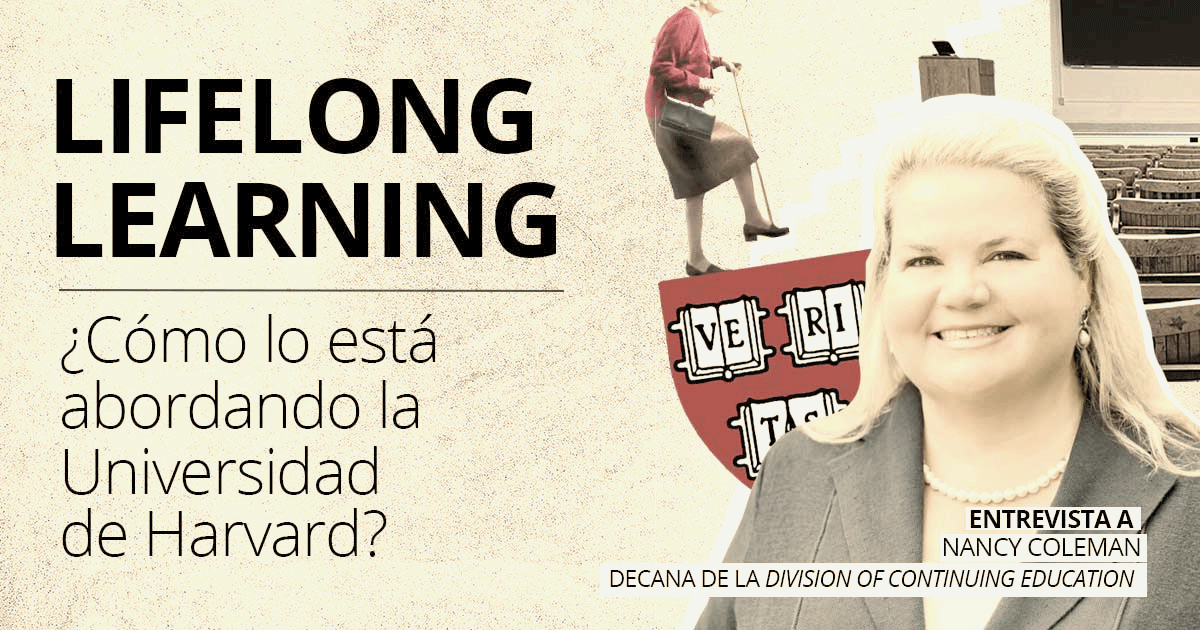On this page
Nancy Coleman, Dean of Harvard: “If we want to remain relevant in our profession, we must never stop considering ourselves university students.”

Thirty minutes. That’s what they gave us. And they had to be used well, because on the other side of the screen was the dean of the Division of Continuing Education at Harvard University (Cambridge, Massachusetts) , Dr. Nancy Coleman. Few can speak about lifelong learning with as much authority as she does: she has spent a large part of her professional life dedicated to running departments dedicated to continuing education. In recent years, her personal challenge has been to do so at one of the most prestigious universities in the world.
And despite the fact that her division is one of the ones that has undergone the most changes in recent years (you will understand why in the interview), she refrains from using grandiose concepts: paradigm shift, empowerment, disruption. Although we still had many questions to ask (When will programs be developed for disciplines such as Architecture, Fine Arts or Chemistry? What should be the relationship between the University and large corporations? And a long etcetera) we appreciate the pause that she gave us in her busy schedule to understand how Harvard University is approaching one of the most important educational trends: if you want to be relevant in your work throughout your professional career, you must cultivate the attitude of the eternal student.
We read on the website of Harvard’s Division of Continuing Education: “Employees, both today and tomorrow, are faced not only with jobs that require new and emerging skills, but also with multiple careers, since many occupations appear and disappear overnight”. How does your department address this challenge?
The rate at which the world is changing exceeds any speculation that our minds have been able to project in the past; some of the things that five years ago seemed impossible, today are. If this rhythm is maintained—and the predictions point to it—our task when designing programs that allow us to prepare our students in the best way and also do it for a future that we do not even intuit is really complicated.
For this, it is necessary to carry out introspective work that allows us to continuously analyze the curriculum that you are offering, remaining vigilant before everything that happens in our environment. This attitude allows us to understand how we can best serve our students. For example, we maintain continuous contact with job creators so that they can guide us on the main challenges that they would like their employees to be able to face and so that we gauge how we can be a decisive variable in that equation.
In addition, our division is closely linked to the Faculty of Arts & Science and the a Liberal Arts education. Our programs combine contents oriented to the professional field with others that have a Liberal Arts approach in such a way that we can prepare our students to have more critical thinking, to be better at solving problems or to know how to communicate better, in other words, encourage all those 21st century skills.
Another of her quotes: ” Traditional education may be obsolete .” Where does this statement place us in 5 or 10 years?
The answer depends directly on the profile of the students. The ones we are welcoming now and the ones we will welcome in the next 5-10 years are not just Millennials, but Generation Z and Alpha. They are all digital natives, they are much more comfortable with technology, and technology-mediated learning is much more attractive to them.
However, the aspect that most intrigues me about these new generations is that they make decisions differently and do so in line with their value system. They do not want to go in single file and follow a path for the sake of it. They want to come to campus and schedule classes at their own pace, they want to learn about topics related to what they are going to do or what interests them.
Certificates are an alternative form of credentials and a way to customize the knowledge they want to acquire.
Dean Nancy Coleman
Could you give us an example of how this change translates?
We see more and more students who are not interested in taking, for example, an MBA in Economics and Sustainability, but rather in completing shorter certificates that are adapted to the curriculum they want to do: they take a course in Economics, another in Sustainability and, perhaps to close the circle well, a more traditional one on Business Administration. Certificates are an alternative form of credentials and a way to customize the knowledge they want to acquire.
I believe that institutions like ours and others in the world continue to be relevant, but we are focused on how to offer the student of tomorrow what they need—for example, that flexibility—with the rigor and quality that characterizes us.
40 years ago we could be more or less sure that the knowledge and skills we learned in our studies would be useful to us throughout our professional career and, as you explained before, we are no longer in that situation.
Indeed. 30 or 40 years ago, you finished your degree and you could more or less consider that you had already finished your studies. Today, I believe that if we want to remain relevant in our professional field, we can never stop considering ourselves university students. The concept of “life long learning”, which has been used for a long time, is now more important than ever precisely because of what we mentioned at the beginning: the world is spinning faster and faster and workers need to be retrained.
If we want to remain relevant in our professional field, we can never stop considering ourselves university students.
Dean Nancy Coleman
According to this thesis, knowledge is continuously updated and, in many disciplines, becomes obsolete in a short time. We wonder if Harvard pays more and more attention to training in skills that accompany the student throughout their professional life, and not so much in theoretical content.
At Harvard, we have the “60-year-old curriculum” paradigm. The goal is to provide education to people throughout a professional career that has the potential to last up to 60 years. And when we address it, we don’t just do it by teaching accounting or marketing, but by instructing people to be, for example, good at solving problems, at knowing how to communicate, or distinguishing between truthful and relevant information and information that is not. And that philosophy also permeates our specific courses for professionals, monographic courses from two to five days in which these specific skills are learned and in which networking plays an important role.
The goal is to provide education to people throughout a professional career that has the potential to last up to 60 years.
Dean Nancy Coleman
Taking into account this tendency for us to always remain connected with the University in order to be able to recycle ourselves, do you think that divisions like yours, focused on continuous training, could have a greater volume of students than traditional faculties?
I think it is very possible, although here we are not focused on how big our department can become, but rather on the specific needs of our students. Our objective—and my vision in particular—is to build an environment that responds to all those needs that students may have throughout their professional career.
You can, for example, be a high school student and start at Harvard with our pre-university summer program, and that’s where we come in, creating a bond with that person so that, six years later, while they’re studying their degree and think “Hey! ! I would like to train in something related to project management ”, they remember us. “I’m sure Harvard has a module on it, I’m going to look.” And ten years later, when they’re already working and want to take a course on leadership, they’ll think back to Harvard again. I think that gives more value.
We also read phrases on the DCE website such as “far from feeling like the oldest in the class” or “our programs focus on meeting the needs of our students at different stages of their lives”. How does Harvard develop programs that meet the needs of such different profiles?
Students of different ages come to Harvard, but also from very diverse ethnic origins, with disparate life experiences and from very different cultures. In addition, we have a very international character. Something that makes us unique is that our pedagogical teams work with teachers and are responsible for reconciling these differences so that, if there is a 25-year-old student in the same class and another who belongs to the Learning in Retirement program, both receive a good education and enrich each other.
And what would be the typical profile of the student of the Division of Continuing Education?
I would say that you are a 35-year-old student, working full-time, with other responsibilities (children or elderly dependents). Few are dedicated solely to study. For this reason, we do not focus on providing, for example, accommodation or food service, but on offering other types of comforts that adapt to your busy life: for example, flexible hours to receive feedback from teachers or advice on career guidance.
As a result of the pandemic, we have seen the potential of e-learning, but technology is offering truly revolutionary horizons such as virtual reality or the famous metaverse. Have you started experimenting with them?
We have always been very progressive in everything related to technology. Innovation is part of our pillars, but we have to do it with caution. The world has a tendency to look at everything that glitters and embrace it because it’s “cool” and “sexy”. We must weigh what these technologies can offer us and the degree of practicality they provide. Otherwise, we can spend the whole day dedicated to those supposed innovations that will not contribute anything the following year.
Companies also offer training that allows workers to improve their skills. What are the differences between this type of courses and those that the University should offer? And what can universities do to remain relevant in this scenario?
Well, is a leadership course offered by a university better than one offered by a company? I think there is no clear answer to this question, but many universities have a lot of work ahead of them if they want to remain relevant in this scenario. The approach in our case goes through marrying the more practical part of workers are looking for with theoretical foundations; we must provide solid pillars of knowledge.
For this, the teaching staff is key: they are people with powerful academic backgrounds, but with a lot of experience in the professional field and who can state: “Well, here is the theory and this is how it really works”. And that is one of our strong points: offering both sides of the same coin, because if the theoretical part is dispensed with—and this is confirmed by my own experience as a student—the programs have neither head nor tail.
* Thanks to Nancy Coleman, Thomas Garriepy, and Harry Pierre for their willingness to collaborate with the Consejo de Colegios Mayores Universitarios.
**This interview has been reprinted with permission by Consejo de Colegios Mayores Universitarios. English translation by Google, with minor editing for grammar by the Division of Continuing Education. Read the original Spanish interview here.
